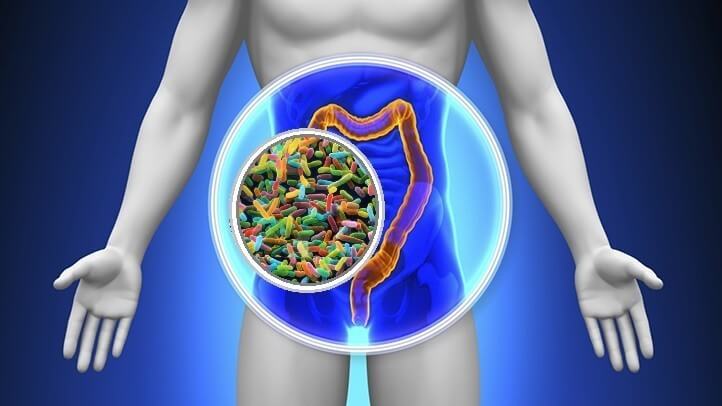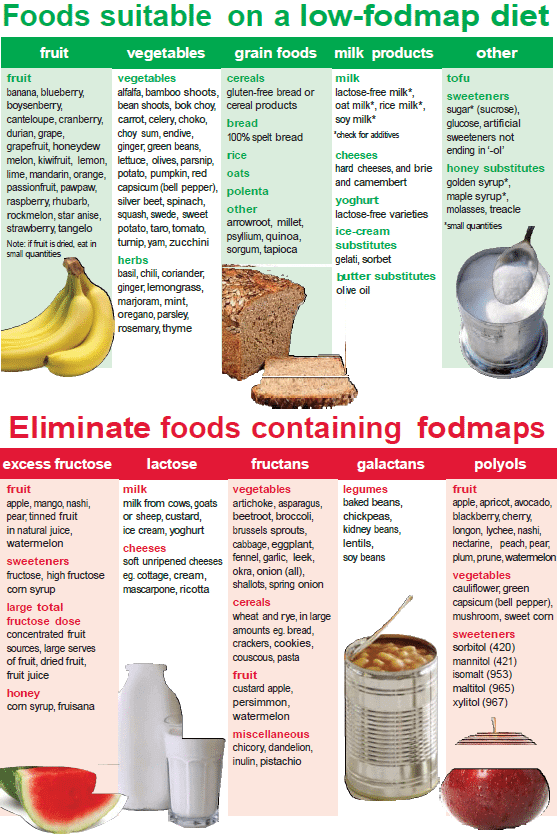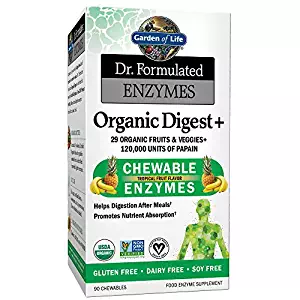It’s almost a right of passage for new vegans to struggle with digestive issues, especially if you switched to the diet all at once.
If you have sharp stomach pains, or this has been going on for multiple months since changing your diet, you should see a doctor.
But if you’re just having gas and bloating, diarrhea or a general upset stomach, it can probably be explained by your new diet.
The good news is that this isn’t permanent. In most cases, it’ll go away by itself. However, you can also take steps to speed up this process and get back to a quiet stomach.
First, I’ll go over what usually causes these stomach issues, and then I’ll show you how to fix them.
Table of Contents
The Root Cause of Most Vegan Stomach Problems: The Gut

Your gut hosts billions of bacteria and other microorganisms, referred to as your gut flora.
Most of them help you by breaking down undigested food, synthesizing vitamins, and metabolizing acids.
The key thing to understand is that the bacteria that thrives is the bacteria that gets fed.
In other words, if you eat a lot of a specific nutrient (e.g. fiber), the bacteria that survives on fermenting fiber will grow and thrive. But its population will shrink if it’s not fed regularly.
People who digest milk easily have a lot of Lactobacillus in their gut, which help breakdown sugars from dairy products. If you don’t have dairy for a long time, most Lactobacillus will die off. If you suddenly reintroduce dairy to your diet, your stomach won’t be able to handle it.
That was just an example, since hopefully you’ll stay vegan.
But the point remains – your gut is a constantly changing and adapting ecosystem, responding to the food you eat.
When you first go vegan, you likely drastically change your diet. The bacteria you need don’t exist in large enough volumes, which can give you stomach problems. Over time, your gut flora will adapt and you’ll find that you digest your food better (and have fewer stomach pains).
Other Possible Causes of Vegan Stomach Issues
Some foods, particularly plant foods, just give people gas.
Some common ones are:
- Textured vegetable protein (TVP) often gives people gas
- Some get gas from tempeh or flaxseed
- Many complain that Beyond Burgers upset their stomach
In most cases, your stomach problems will go away after 6-8 weeks at the longest as your gut flora adapts.
But not always.
Here are some other explanations of stomach issues on a vegan diet.
Too Much Fiber (Very Common)
This is partially related to your gut flora, as some fiber is fermented in your gut.
When you switch from a typical Western diet that has very little fiber, to a normal vegan diet, your fiber intake goes way up.
That’s a good thing!
Study after study has found that dietary fiber helps reduce cardiovascular disease, colorectal cancer, type 2 diabetes, and more.
But again, you may not be used to it right away. It’s also possible to eat too much fiber for comfort on a vegan diet, if all you eat are beans and veggies.
It’s likely not bad for your health, but fermenting fiber produces gas, and there’s just no avoiding it if you’re eating a ton of fiber.
First, refer to this list of the top vegan sources of fiber, or more specifically, the vegetables highest in fiber. Then, track your diet using Cronometer for a week or so and see how much fiber you’re taking in. Then try reducing it and see if that makes a difference.
Fiber can cause stomach problems if you consume much more than you’re used to, which is common for new vegans.
Too Much Fat
Too much fat, especially in one meal can cause abdominal cramps and diarrhea.
It’s mainly a concern for those with irritable bowel syndrome (IBS), but too much fat can cause stomach problems in anyone.
When you first go vegan, you may find yourself eating a lot more:
- Seeds
- Nuts
- Oil
It’s easy to snack on handfuls of peanuts and almonds, but the fat really adds up.
If you suspect this is your issue, just cut down on how much fat you’re eating, or try to spread it out more.
Many new vegans rely on fats to get calories. If they’re not used to it, it can cause stomach issues. Over time, the body adapts (like on a keto diet), and runs off fats better.
An Increase in FODMAPs
FODMAPs (Fermentable Oligosaccharides, Disaccharides, Monosaccharides and Polyols) describe a range of carbohydrates that certain foods contain (mostly plants).
If you’d like more detail, here’s a thorough guide to FODMAPs.
A vegan diet is more likely than your former diet to contain these foods and trigger stomach issues.
Take a look at this image with lists of high and low FODMAP foods:

If you think you’re eating a lot of foods on the bottom (red) half, this may be the cause of your issues.
Peanut butter is low in FODMAPs and a good food to include in your diet if you’re having trouble getting enough calories.
Here’s a short, but informative video on how to test out a low FODMAP diet.
Certain types of foods called FODMAPs cause stomach issues in a fairly large group of people. Eating too many of these, which is possible as a vegan, can cause issues.
Remedies for Stomach Problems
On top of the solutions we’ve looked at already, there are a few other things you can do:
- Take digestive enzymes or vegan probiotic powder – These supplements help your body digest food and are completely safe. Here’s a guide to Beano and vegan alternatives. Alternatively, foods like pineapple and papaya naturally contain digestive enzymes, so eating more of them may help your stomach issues.

- Soak your beans and legumes – You can remove most of the oligosaccharides (a FODMAP) and other antinutrients by soaking or sprouting them. Sprouting beans made a big difference for me personally when I first went vegan. I went from chili making me bloated, to no ill effects at all.
- Eat slower – Plants in general are hard to break down because they have tougher cell walls. Chewing more will help pre-digest your food before it enters your stomach.
- Temporary caloric restriction – If you’re wondering if you’re simply eating too much of something (fiber, FODMAP, etc.), a simple test is to simply eat much less than normal for a few days. If that clears up more issues, then your body is having trouble with the volume of something that you were eating, and you can start ruling things out.
Final Thoughts on Vegan Stomach Problems
I know that going vegan is hard, inconvenient, and even a little scary at first.
It’s hard enough to figure out what to eat, and dealing with stomach issues doesn’t help with that.
What I can say is it does get easier. Much easier.
After a few months, following a vegan diet won’t be any more difficult than your old diet, and you’ll likely feel more healthy and full of energy as well.
Just don’t give up, you can persist through these obstacles.
FAQs
How can I improve my digestion on a vegan diet?
To enhance digestion as a vegan, focus on gradual dietary transitions and prioritize a well-balanced intake of fiber from various plant sources. Chew food thoroughly to aid in the breakdown process and consider incorporating fermented foods like sauerkraut or kimchi to support gut health with beneficial bacteria. Staying hydrated is essential, as water helps move fiber through the digestive tract.
Are there vegan-friendly supplements to aid digestion?
Yes, there are vegan-friendly supplements that can support digestion. Digestive enzymes derived from plant sources like fungi can assist in breaking down macronutrients and alleviating digestive discomfort. Probiotics, available in vegan formulations, can promote a healthy balance of gut bacteria. Additionally, peppermint oil capsules and ginger supplements may help ease symptoms of indigestion or bloating. It’s advisable to consult with a healthcare professional before incorporating any supplements into your routine to ensure they align with your specific health needs.
Can a vegan diet lead to nutrient deficiencies that impact digestion?
While a well-planned vegan diet can meet nutritional needs, deficiencies in certain nutrients may occur if not adequately addressed. Vitamin B12, iron, calcium, and omega-3 fatty acids are nutrients that vegans should pay attention to. Inadequate intake of these nutrients can potentially affect digestive health, leading to symptoms such as fatigue or anemia.
How can I manage gas and bloating on a vegan diet?
To manage gas and bloating on a vegan diet, start by identifying specific trigger foods and gradually introducing them into your diet. Cooking certain vegetables and legumes can make them easier to digest. Additionally, incorporating herbs and spices like fennel, ginger, or peppermint may help alleviate digestive discomfort. Be mindful of portion sizes, as consuming large amounts of fiber-rich foods in one sitting can contribute to bloating. Drinking herbal teas, such as peppermint or chamomile, can have soothing effects on the digestive system. If symptoms persist, seeking guidance from a healthcare professional or registered dietitian can provide personalized strategies for managing gas and bloating.

Thanks so much for this. I’ve just started eating vegan, wanting to be healthier, and I’ve been so frustrated that I’ve been so gassy. I was going to give up today, but I’ll give it more time for my gut flora to catch up!
Good luck Gareth.
I’d recommend sticking to vegan foods that you likely ate before as much as possible (e.g. bread, rice, oats) to make it easier on your stomach for now.